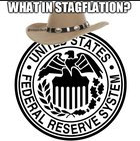Mercantilism, Smells Like Stagflation
After two days of panic selling of stocks, recession and stagflation have become part of the conversation. Joshua Zietz wrote for Politico, “Stagflation — “the s-word rippling through Wall Street and Main Street,” as Axios put it earlier this week — is a calamitous anomaly whereby the economy manifests low growth and high inflation at the same time. Anyone who remembers the 1970s will recall that it caused an economic crisis in the United States, ushering in a turbulent era of high prices, interest rates and unemployment — and considerable instability and pain.”
Donald Trump’s plan to liberate America from globalization requires high tariff walls that will usher in a golden age of plentiful manufacturing jobs and widespread prosperity as industrial production blossoms across the U.S. He claims the Chinese, the European Union, and other trade partners’ predatory trade practices have stolen American jobs and industries which rightfully belong in the United States.
Trump’s tariff policy is essentially mercantilism. Economist Murray Rothbard explained mercantilism, which reached its height in Europe of the 17th and 18th centuries. “Thus, a policy of favoring exports and penalizing imports had two important practical effects: it subsidized merchants and manufacturers engaged in the export trade, and it threw up a wall of privilege around inefficient manufacturers who formerly had to compete with foreign rivals. At the same time, the network of regulation and its enforcement built up the state bureaucracy as well as national and imperial power.”
The American revolution was spurred by the English Navigation Act, which Rothbard explained:
The network of restriction greatly penalized Dutch and other European shippers, as well as American shipping and manufacturing, for the benefit of English merchants and manufacturers, whose competition was either outlawed or severely taxed and crippled. The use of the state to cripple or prohibit one’s competition is, in effect, the grant by the state of monopolistic privilege; and such was the effect for Englishmen engaged in the colonial trade.
A further consequence was the increase of tax revenue to build up the power and wealth of the English government, as well as the multiplying of the royal bureaucracy needed to administer and enforce the regulations and tax decrees. Thus, the English government, and certain English merchants and manufacturers, benefited from these mercantilist laws, while the losers included foreign merchants, American merchants and manufacturers, and, above all, the consumers of all lands, including England itself. The consumers lost, not only because of the specific distortions and restrictions on production of the various decrees, but also from the hampering of the international division of labor imposed by all the regulations.
The President sold his policy as being pro-American workers. But, as Rothbard points out, “Far from being true friends of laborers, the mercantilists were frankly interested in exploiting their labor to the utmost; full employment was urged as a means of maximizing such exploitation. Thus, the mercantilist William Petyt wrote frankly of labor as ‘capital material … raw and undigested … committed into the hands of supreme authority, in whose prudence and disposition it is to improve, manage, and fashion it to more or less advantage.’”
Higher prices and lower growth look to be on the horizon. Richard Clarida, a former vice chair of the Federal Reserve who now advises the Pacific Investment Management Company, told Bloomberg that he already sees a “whiff of stagflation” in the economy.
Everyone can smell it but the President.






